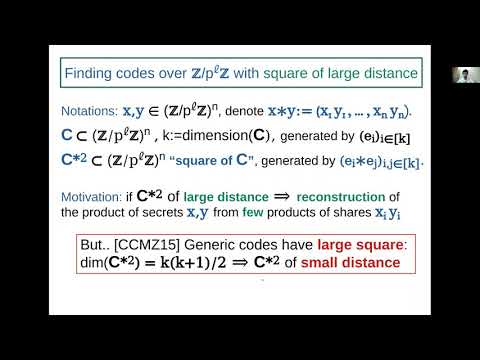CryptoDB
Asymptotically-Good Arithmetic Secret Sharing over $Z/p^{\ell}Z$ with Strong Multiplication and Its Applications to Efficient MPC
| Authors: |
|
|---|---|
| Download: |
|
| Conference: | CRYPTO 2021 |
| Abstract: | The current paper studies information-theoretically secure multiparty computation (MPC) over rings $\Z/p^{\ell}\Z$. This is a follow-up research of recent work on MPC over rings $\Z/p^{\ell}\Z$. In the work of \cite[TCC2019]{tcc}, a protocol based on the Shamir secret sharing over $\Z/p^{\ell}\Z$ was presented. As in the field case, its limitation is that the share size has to grow as the number of players increases. Then several MPC protocols were developed in \cite[Asiacrypt 2020]{asiacrypt} to overcome this limitation. However, the MPC protocols in \cite[Asiacrypt 2020]{asiacrypt} suffer from several drawbacks: (i) the offline multiplication gate has super-linear communication complexity; (ii) the share size is doubled for the most important case, namely over $\Z/2^{\ell}\Z$ due to infeasible lifting of self-orthogonal codes from fields to rings; (iii) most importantly, the BGW model could not be applied via the secret sharing given in \cite[Asiacrypt 2020]{asiacrypt} due to lack of strong multiplication. Our contribution in this paper is three fold. Firstly, we overcome all the drawbacks in \cite{tcc,asiacrypt} mentioned above. Secondly, we establish an arithmetic secret sharing with strong multiplication, which is the most important primitive in the BGW model. Thirdly, we lift Reverse Multiplication Friendly Embeddings (RMFE) from fields to rings, with same (linear) complexity. Note that RMFE has become a standard technique for amortized communication complexity in MPC, as in \cite[CRYPTO'18]{crypto2018} and \cite[CRYPTO'19]{dn19}. To obtain our theoretical results, we use the existence of lifts of curves over rings, then use the known results stating that Riemann-Roch spaces are free modules. To make our scheme practical, we start from good algebraic geometry codes over finite fields obtained from existing computational techniques. Then we present, and implement, an efficient algorithm to Hensel-lift the generating matrix of the code, such that the multiplicative conditions are preserved over rings. Existence of this specific lift is guaranteed by the previous theory. On the other hand, a random lifting of codes over from fields to Galois rings does not preserve multiplicativity in general. (Notice that our indirect method is motivated by the fact that, following the theory instead, would require to ``preprocess'' the curve under a form with ``smooth" equations, in particular with many variables, before lifting it. But computing on these objects over rings is out of the scope of existing research). Finally we provide efficient elementary methods for sharing and (robust) reconstruction of secrets over rings. As a result, arithmetic secret sharing over $\Z/p^{\ell}\Z$ with strong multiplication can be efficiently constructed and practically applied. |
Video from CRYPTO 2021
BibTeX
@inproceedings{crypto-2021-31257,
title={Asymptotically-Good Arithmetic Secret Sharing over $Z/p^{\ell}Z$ with Strong Multiplication and Its Applications to Efficient MPC},
publisher={Springer-Verlag},
doi={10.1007/978-3-030-84252-9_22},
author={Ronald Cramer and Matthieu Rambaud and Chaoping Xing},
year=2021
}

